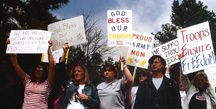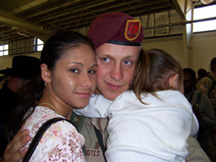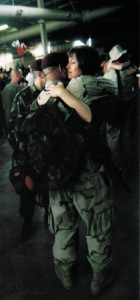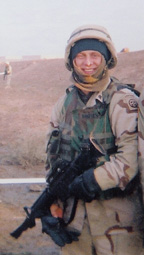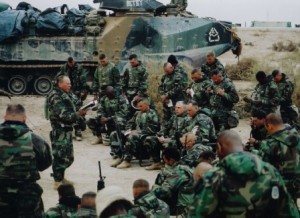WHILE THEY’RE AT WAR
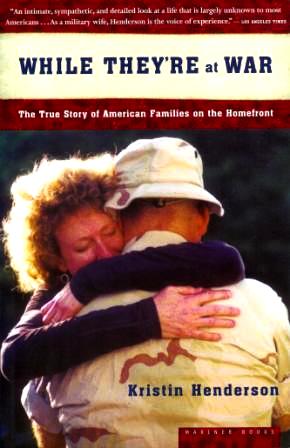 SUMMARY |
||
|
SUMMARY Kristin Henderson is a journalist married to a military chaplain who has served in the Persian Gulf, Afghanistan, and Iraq. In While They’re at War, she draws upon the trust she’s earned from military families and her unique access to military staff to give us a “powerful, revealing, and sometimes painful . . . look behind the scenes” (Booklist) of the modern military’s untold story. We first meet Marissa Bootes and Beth Pratt, new Army wives undergoing intense indoctrination on Fort Bragg, NC, while their husbands are fighting in Iraq. Their stories unfold to reveal often hidden aspects of life on the homefront. Through gripping storytelling, we see families battling the overwhelming effects of isolation and anticipatory grief, the strongly enforced codes concerning infidelity, their feelings of alienation from military staff and nonmilitary citizens, and the harrowing impact of e-mail/cellphone/CNN culture. Moving scenes bring to life the special struggles of children and those who teach and care for them, as well as the toll that combat exposure takes on families, especially if it erupts into homecoming violence. Finally, Henderson captures the life-changing solidarity experienced in an informal support group like Fort Bragg’s Hooah Wives. While They’re at War is an indelible portrait, too, of virtually invisible figures such as homefront fathers raising teenagers alone. We also meet the chaplains, social workers, and psychiatrists dedicated to helping military families cope. And, through Henderson’s brilliant reporting from Walter Reed Army Medical Center’s Ward 57, we are given a searing view of the wounded and their families confronting changed lives. “In a country of nearly three hundred million people,” Henderson writes, “only two and half million serve in the armed forces … Yet in our American democracy, the warriors themselves don’t get to decide when [sacrifices] are to be made. Civilians make that decision. It’s up to our civilian Congress to declare war … and it’s up to the civilians who elect those leaders to pay attention, to make sure that the cause of the hour is worth the sacrifices being made on their behalf.” While They’re at War is moving and necessary testimony for all Americans, from the military families who make possible America’s way of war and way of life. EXCERPT & PHOTO GALLERY TABLE OF CONTENTS 1. PART I: LEAVING HOME 2. 3. 4. 5. PART II: THE HOMEFRONT 6. 7. 8. 9. 10. 11. 12. 13. 14. PART III: COMING HOME 15. 16. 17. 18. FROM CHAPTER ONE OF WHILE THEY’RE AT WAR: 1. Welcome to the Sisterhood “Does it get easier?” asked Beth Pratt. She had a voice that was flat as the Midwestern Plains state she came from. She had a long, fragile neck and a willowy dancer’s body that drooped with sadness. She had a husband in a war zone. She was asking me because, twice already, I too had waited for my husband to come home from a war — first Afghanistan, then Iraq. I was visiting Fayetteville, North Carolina, home of the Army’s Fort Bragg, when a friend said he knew a woman who needed to talk to me. He introduced me to Beth. “This is our first deployment,” she said. Her eyes were wide and blue green and shadowed by her straight, dark hair. She gave me a level look before withdrawing her gaze and adding, “They say it’s supposed to get easier but it’s been four months and so far it’s just been hard. When does it get easier?” “Oh,” I said, and the oh dragged itself into a sigh while I tried to decide whether or not to lie. I wanted to fix it for her; I wanted to make it all right. But I knew the only thing that would make everything right would be for her husband to walk through that door right now, safe and whole in body and mind, the same man he was when he left. So in the end, I couldn’t. I couldn’t lie to her. When does it get easier? “It doesn’t,” I said. “Wartime deployments are always hard.” “Don’t tell me that,” she said. But they are, they’re just so hard. Eventually you figure out ways to cope — or not. But they never get easy. A wartime deployment is always a mountain, no matter how you climb it. All I could do was tell her some of the climbing techniques I’d relied on to help manage the fear and the loneliness, and listen to her anger and bewilderment as she climbed it now herself. When Beth left, she hugged me. And I thought, Welcome to the sisterhood. Over the course of her husband’s deployment, while she was worrying about his survival, Beth Pratt’s own survival was hanging in the balance. Though I didn’t realize it at the time — no one did — Beth had begun to think about killing herself. This is her story. * |
I came across Marissa Bootes on the Internet. She belonged to a group of Fort Bragg wives who had formed their own private support group online. The first time I met Marissa in person, she had tied her long, dark hair in a ponytail. She was broad-shouldered and narrow-hipped in a black tank and black pants with a racing stripe down each leg. She looked faintly exotic and streamlined; she was moving fast.
She talked fast, too. “When my husband deployed I was working sixty-plus hours a week and suddenly taking care of our five-year-old daughter by myself, and this house, and the bills, and volunteering with the Family Readiness Group for my husband’s unit — ” She paused long enough to light a cigarette. “I’m an over-achiever.” She exhaled smoke. “I was doing the Superwoman thing, I felt awesome.”
I was forty-two, nearly twice her age. I saw right through that smoke she was blowing, spotted a part of my younger self through the haze. I used to get busy like that, too. When the feelings got to be too much, I’d just get too busy to feel.
The first half of the deployment that’s what Marissa did. Gave herself four hours each night to sleep, the other twenty hours devoted to constant motion, because when she took the time to think about her husband she couldn’t breathe. But before this deployment ended, because of this deployment, Marissa Bootes would find herself crashing head-on into the memories of a painful past she was trying to outrun. Not only that, she would be forced to give up one dream — the career she had hoped for since she was a child — but she would make another dream come true. This is her story, too.
*
Anyone who watches TV has seen the familiar images from the warfront: military men and women in desert camouflage uniforms riding in Humvees, patrolling dusty streets, firing their weapons.
The homefront gets a lot less screen-time — the camera swings around to focus on military families just long enough to peek through the window at the tearful goodbye and the joyful homecoming and, in between, the occasional yellow ribbon moment. The rest of the homefront experience is hidden behind a closed door. Out of pride, or perhaps a feeling of vulnerability, those of us who live the homefront life often feel the need to protect ourselves from anyone who has never been left behind during a deployment.
“They don’t have any idea what it’s like,” I complained to an Army chaplain. “They just can’t understand.”
He looked thoughtful for a moment. Then he said, “Maybe they don’t understand because we don’t tell them.”
So this is the story of Beth and Marissa’s friends and fellow military spouses, and the chaplains, social workers, teachers, and support staff with whom they crossed paths. It’s the story of the Beths and Marissas scattered across America and on military installations around the world, who, like them, hurry through their days listening for the distant sound of guns.
Both Marissa Bootes and Beth Pratt are married to junior enlisted men in the 82nd Airborne Division. Beth’s husband, Private E-2 Luigi Pratt, drove Army trucks on convoys through Iraq’s Sunni Triangle. On other convoys along those same roads, Marissa’s husband, Specialist Charlie Bootes, manned a Mark-19 fully automatic grenade launcher.
Marissa and Beth never met while their husbands were deployed. Marissa was twenty-three when the deployment began. She grew up in foster homes, had a two-year degree under her belt, and was married to her high school sweetheart. On the subject of the war, she had no patience for Americans protesting in the streets; it killed morale, she said, made life harder for soldiers and their families. Beth was thirty-three. She had a happy childhood, held multiple postgraduate degrees, and was newly married for the second time, no children. As for the war, she believed it was wrong from the start. The UN weapons inspectors, it seemed to her, had been doing just fine.
Beth and Marissa didn’t have much in common except for this: In the fall of 2003 they both faced the frightening challenge of their husbands’ first deployments. And they knew it wasn’t likely to be their last, either. Given America’s increasing military commitments around the world, even if their husbands came home, they wouldn’t be home to stay.
This shared experience creates a bond like sisterhood. Those of us who are married to the military may be female, or may be male — our honorary sisters. We may be white, black, or brown, young, old, Republican, Democrat, or independent. We may worship different gods or no god at all. We may be high-school dropouts or holders of advanced degrees. We may not even be officially married, may be engaged or living together or seriously dating. But at one time or another, we have all been left behind while the one we love has gone off to train for battle, or keep the peace, or wage war. Particularly for those of us who have waited for our loved ones to return from a combat zone, it’s like joining a secret society — when you encounter another member of that society, not much needs to be said.
“Is your husband home?” I asked a woman I had just met at a conference of military spouses. She looked like a southern belle and talked like a trucker.
Her macho voice suddenly shrank. “No, he left two months ago. Iraq.”
Tears suddenly welled in our eyes. We both ran a careful finger along the lower edge of each eye, to wipe the tears without smearing the makeup. We were at a cocktail party. You don’t burst into tears at cocktail parties. For a moment, she blinked at the far distance, swallowing hard. Then she suddenly turned to me and told a deliciously dirty joke about southern belles that saved us both.
*
A civilian reporter once asked me, “Does it ever bother your husband that you’re…” He fumbled for the right words. “That you’re writing about the wives instead of the real story?”
The question itself speaks volumes. Despite the fact that America is once again engaged in major combat operations overseas, most Americans have only a limited grasp of what it means to go to war, and no wonder. The Persian Gulf War and the Iraq and Afghan Wars a decade later are the first major wars in America’s history that have been fought without broad-based conscription to mobilize all levels of American society. Going forward, this is a potentially ominous development for our democracy. In a country of nearly three hundred million people, only two and a half million serve in the active-duty armed forces, the Reserves, and the National Guard. Only these warriors and their families are experiencing the day-to-day sacrifices, small and large, that war requires.
Yet in our American democracy, the warriors themselves don’t get to decide when those sacrifices are to be made. Civilians make that decision. It’s up to our civilian Congress to declare war. It’s up to our civilian president to send the troops into battle. And it’s up to the civilians who elect those leaders to pay attention, to make sure that the cause of the hour is worth the sacrifices being made on their behalf.
The sacrifices start as soon as a person signs an enlistment contract or accepts an officer’s commission. Those who join the United States Armed Forces give up many of their constitutional rights in order to ensure that other people can continue to enjoy them. They give up their freedom of speech. Sometimes, they give up their right to live. No other institution in America wields so much power over the lives of its members. And even though their families haven’t joined the military, it controls the families’ lives, too.
Of course, it isn’t really an “it.” The military is more of a “them.” Though we say the Army did this, or the Marine Corps did that, as if a military institution is a monolithic giant operating under the control of a single brain, in reality it’s a big, messy collection of individual human beings. Some of them are military service members and some of them are civilian employees. Many of the people who provide services to military families, for instance, may work on a base but in fact work for private companies that have won contracts from the Pentagon. All these individuals — whether they wear a uniform or are a private contractor, a federal employee, or a political appointee — are the military. Some of them are very good at what they do. Some are not. All have the power to affect the lives of the military families who cross their paths.
Is my husband bothered that I don’t train the spotlight on him and his combat experiences, or on the experiences of the Marines he serves, or the soldiers, sailors, and airmen who serve alongside them? Of course not. Because the men and women who go to war will tell you that the loved ones they leave behind have a profound effect on their ability to hold up under fire. These days, this reality is recognized even in official Pentagon policy. A Department of Defense philosophy statement reads:
“…families as well as the service member contribute immeasurably to the readiness and strength of the American military. Efforts toward improved quality of life, while made out of genuine respect and concern for service members and families’ needs, also have a pragmatic goal: a United States that is militarily strong.”
Military readiness is like a three-legged stool. The first leg is training, the second, equipment. The third leg is the family. If any of these three legs snaps, the stool tips over and America is unprepared to defend herself.
When our nation decides to wage war, we women and men who love America’s warfighters comfort them when they call home sounding hollow, we manage their lives while they’re gone — we pay their bills, service their cars, care for their children. We’re told: “If there’s a problem, don’t cry to your spouses, there’s nothing they can do about it, it will only distract them, and where they are, distractions can be fatal.” So we solve the problems ourselves. And while we’re doing all that, we’re waking up every morning knowing today could be the day the staff car pulls up in front of our house and two or three people in dress uniforms walk up to our door. Today could be the day our life as we know it disappears into a black hole of grief. As a result, when our warriors return, they’re not coming home to the same person they left behind.
This is the war story you never hear. This is the story of what happens while they’re at war . . .
REVIEWS
Read the Goodreads.com reader reviews
“Most of us are aware of the horrors of war and of the sacrifice made by our fighting men and women. Less well understood is the burden borne by the families our service members leave behind. While They’re at War reveals their solidarity and hope; their loneliness and anguish in the face of uncertainty. Authentic and from-the-heart, this is a piece of often untold American history, and a must-read for those both in and out of uniform.”
~ Senator John McCain
“While They’re at War is the powerful story of those on the homefront who are also on the tip of the spear in terms of suffering in war. It is their story — the true story — of the ultimate costs of war.”
~ former VA Director & Senator Max Cleland
“Engrossing and often heartbreaking… Henderson is a compassionate expert witness… This is an emotional book that effectively plies the complexities of military life.”
~ Publishers Weekly, STARRED REVIEW
“A standout … war book, bringing a vital, often overlooked perspective on America’s ongoing debates about Iraq.”
~ Kirkus Reviews
“This is a story that begs to be told. Whether you’ve ever sent a loved one ‘into harm’s way’ or not, this book gives you a poignant and honest picture of what those of us who have remained behind go through when a family member goes to war.”
~ Mrs. Joan Shalikashvili & General (retired) John Shalikashvili, former Chairman of the Joint Chiefs of Staff
“A vivid picture of the families behind America’s armed forces.”
~ National Public Radio, All Things Considered
“Eye-opening… a wide-ranging portrait of this war’s effects on the day-to-day lives of military wives and a few husbands.”
~ The Washington Post Book World
“The truth from the home front… a revealing and nonpartisan look at the military families behind the headlines. ”
~ Parade Magazine
“Henderson has used her access to that secret society to excellent journalistic advantage… An intimate, sympathetic and detailed look at a life that is largely unknown to most Americans . . . As a military wife, Henderson’s is the voice of experience.”
~ Los Angeles Times
“Delivers a powerful and poignant message… a book that ought to be a must-read for the president and members of Congress.”
~ Sacramento Bee
“Powerful, revealing, and sometimes painful…”
~ Booklist
“Henderson is a master of details… delivering many opportunities to identify with various military families, to empathize and, most assuredly, to cry… An unpretentious, down-to-earth look at what spouses and family members of
deployed soldiers endure on both the material and mental landscapes.”
~ Richmond Times-Dispatch
“Henderson is gifted with both the outward and the inward gaze. She’s become an indispensable chronicler of the homefront in this period of foreign war and domestic contention.”
~ Washingtonian Magazine
“Kristin Henderson paints in vivid scenes, while painlessly slipping in the policies that we as citizens must demand of the armed services, Congress, and president. I want every American to read this book to understand that when we send young (or not so young!) men or women to war, we really send whole families — spouses, children, parents, brothers and sisters.”
~ Jonathan Shay, M.D., Ph.D., VA psychiatrist and author of
Achilles in Vietnam & Odysseus in America: Combat Trauma and the Trials of Homecoming
“We rightly say that the American military is the best armed force in history. Less well understood is the family foundation for that force. Henderson shares that insight from an insider’s perspective in a moving narrative.”
~ John Hamre, former Deputy Secretary of Defense,
President & CEO of the Center for Strategic and International Studies
“Kristin Henderson brings a most unusual perspective to this urgent story… a very human look at two women at Fort Bragg, NC, as they confront the challenges of their husbands’ first overseas deployments.”
~ Seattle Post Intelligencer
“Vivid and often emotionally charged… Henderson writes as an insider and outsider, someone who can describe her own struggles as a soldier’s wife even as she turns her reporting skills on the military and spouses now treading the same path she is.”
~ Raleigh News and Observer
“I don’t know whether to laugh, cry, or stand up and cheer. Sometimes I think I should just do all three! It takes remarkable people — service members, spouses, parents, and children — to make a military family these days. I’m glad we have them, but worry whether we as a nation have the will to help them meet the challenges they face now or will continue to face… They need to know that people understand their life and believe their sacrifice is important. Henderson’s words do that.”
~ Joyce Wessel Raezer, Govt. Relations Director,
National Military Family Association
“War is hell. We’ve all heard this quote but what does it mean? While They’re at War gives you the first person perspective from families and soldiers who have served. Sometimes the battles are not only fought over there but also here at home. While They’re at War is a must-read for anyone who yearns to truly understand the multidimensional consequences of war.”
~ Steve Robinson, Gulf War veteran
and Govt. Relations Director, Veterans for America
“So often military spouses are newsworthy only for the pathos and pity and drama of their lives. Kristin Henderson is one journalist who sees so much more. She not only understands why military families do what they do, she sees their place in the big picture. This is the year’s most worthy work about America in wartime.”
~ Jacey Eckhart, military family columnist
and author of The Homefront Club
“You won’t be able to put this book down! It grabs your attention and doesn’t let you go. We haven’t been able to stop talking or thinking about While They’re at War. We believe every American should read it not only to honor military members and their families but to also understand what it means when loved ones are sent to war. As military spouses we found Kristin truly captured the truth of this lifestyle.”
~ Kathie Hightower & Holly Scherer, authors of
Help! I’m a Military Spouse… I Get a Life, Too!






